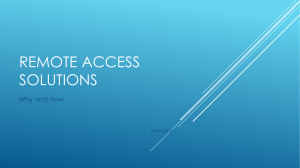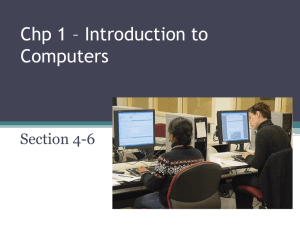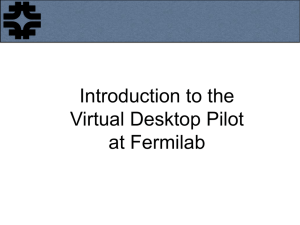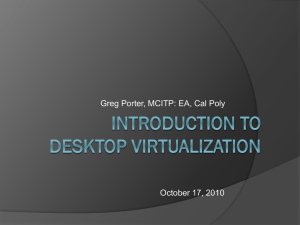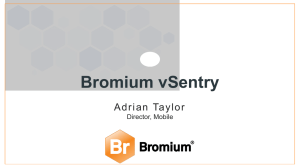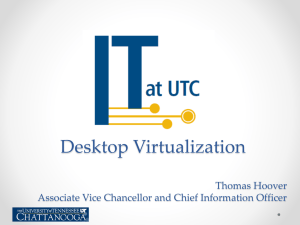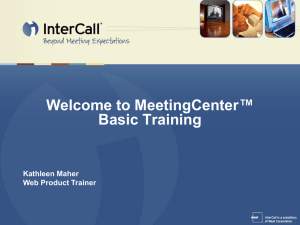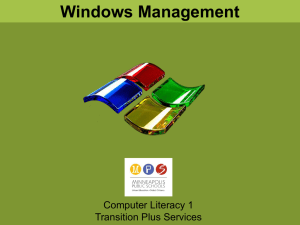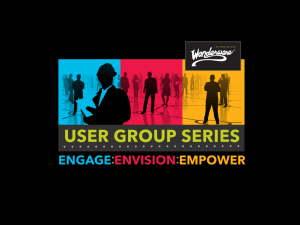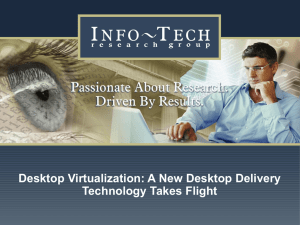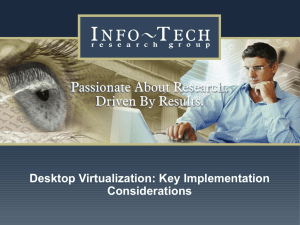Desktop virtualization
advertisement
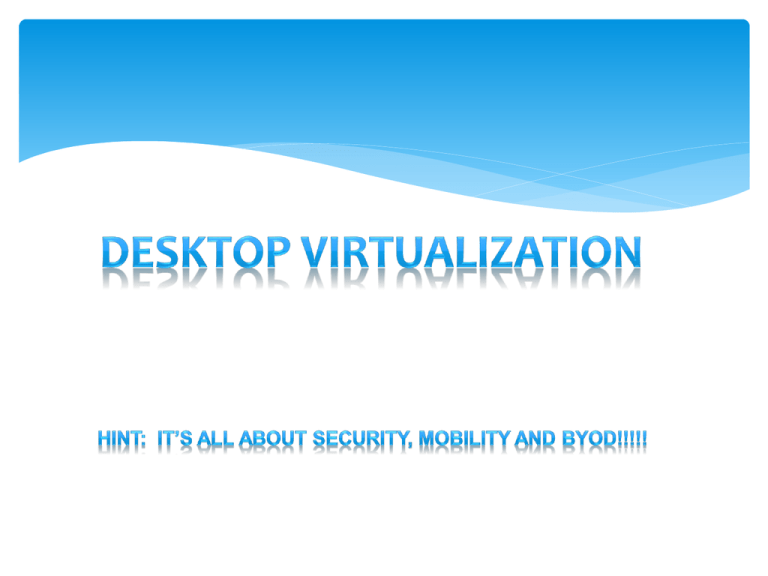
AGENDA What Is Desktop Virtualization? How Does Application Virtualization Help? How does V3 Systems help? Getting Started Evolution of End-user Computing From Server-based Computing To Distributed Computing Another Way to Put It: The Age Old IT Problem Traditional Desktop Model •Asset maintenance and support costs •Deployment and configuration of hardware The Solution Virtual Desktop Model •New desktop – and new or upgraded application stacks – delivered by updating central image Virtual Desktop Model •Management of app and OS configurations •Eliminates need to individually deploy or configure new desktop hardware •Troubleshooting Source: Info-Tech Research Group •Enables BYOD!!!! What can we do? Otherwise known as: Centralize, Virtualize, and Deliver on Demand Separate Applications and Operating Environments • Local Users Teleworkers Remote Worker Move applications and data from individual machines to the data center • Maintain and test in one secure place (Security) • Deliver instantly and ondemand to any device, anywhere (Mobility / BYOD) Mobile Worker Contract Worker Data Center Back-up Data Center IT as Asset Management to IT as a Service Traditional Distributed Computing Virtualized Desktops IT Focus The focus is on acquisition, configuration, and deployment of distributed hardware assets. The focus is on delivery of a centrally hosted desktop computing experience to end users. Service Ongoing support involves configuration and deployment of applications, and OSs across distributed assets. Quality of service is dependent on hosting servers, network, connection brokering, and endpoint access devices. Desktop PC is the focal point between user needs and IT’s ability to deliver service. PC support is critical to service levels. The desktop access device is no longer the focal point. Drive endpoint maintenance and support toward zero while maintaining or improving End User From Info-Tech Research Group Desktop Virtualization Solution Virtual Desktop Apps virtual delivery protocol User Settings Users Data Center OS On-demand Assembly Single master image of each component Dynamically assembled at runtime Delivered with best user experience Application Virtualization: Four Simple Steps First: Centralize Applications Centrally configure, store, and maintain a single (or a few) application image(s) in the datacenter, either on multi-user terminal servers or centralized virtual machines Enable seamless delivery from any operating system. Application Virtualization Second: Configure Access System intelligence and configurable access controls automatically determine the optimal method for delivering each application based on the user scenario, device capabilities, network performance, connection location, and security profile Granular access depending on who you are and where you are connected from Example: Connection from gov’t issued device gets all access, while same user connected from mobile device cannot download or print Application Virtualization Third: Enable Self-Service (If Desired) Users can subscribe to the applications they need from a simple enterprise app storefront and gain instant access from whichever device is most convenient–PC, Mac, netbook, tablet, or smartphone Think of ITunes app store In addition, users can use self-service to perform routine help desk functions (password resets, etc.) Application Virtualization Then: Deliver Apps on Demand XenApp delivers applications via a high speed delivery protocol for use while connected: Streamed vs Hosted mode Copied to the device for use when offline (Offline Mode) Application Virtualization And It’s Enterprise Ready Enable as few as two servers or scale on demand to support multiple datacenters, more than 100,000 concurrent users, and even multiple sites throughout the world IT can ensure rapid response to business and user needs with built-in comprehensive management capabilities that enable rapid provisioning, centralized control, workflow automation, and system-wide performance analysis The 21st Century! The 21st Century! Let’s Review the Desktop Virtualization Benefits for IT • Reduce desktop support costs by up to 40% through centralized desktop & app deployment and management, and improved desktop reliability. • Boost productivity and flexibility by providing users with anywhere and any-device access to their work. • Bolster security of user data and simplify DR by separating desktop processing & storage from desktop hardware. • Lower operational expenses by extending the life of desktop hardware Source: Info-Tech Research Group V3 Overview V3 delivers the fastest end-user computing experience in the world today V3 Systems revolutionizes the speed, ease, deployment and even the size of the infrastructure required for Virtual Desktops. V3 Systems achieves this level of speed through patent-pending technologies and innovative software features that manage and enable the V3 purposebuilt appliance to provide the best end-user experience in the industry today. Confidential and Proprietary Copyright © 2013 V3 systems, Inc. 20 Performance “Speed’s a funny a thing. You never know you need it until you experience it; then you can’t live without it.” Peter Bookman Founder V3 Systems V3’s Computing Solution vs. a high performance PC Confidential and Proprietary Copyright © 2013 V3 systems, Inc. 21 Focus the Pilot on Delivering Quick Wins and Short-term Savings Consider the following scenarios of “low-hanging fruit” Secure Home Access Provide remote users access to virtual desktops from their own access devices at home instead of deploying laptops Why it works… Laptops are often used to provide work-at-home users with access to a secure desktop providing a DR option Implementers have saved by providing remote access to secured virtual desktops instead without sacrificing user experience Source: Info-Tech Research Group Focus the Pilot on Delivering Quick Wins and Short-term Savings New PC Candidates Pilot with users ready for a new PC to secure participation and user buy-in Why it works… Users will be more willing participants given degraded performance on their old PC, and often see a performance boost on the virtual desktop It may also be possible to provide them with a performance and software upgrade without upgrading their hardware Source: Info-Tech Research Group Focus the Pilot on Delivering Quick Wins and Short-term Savings Virtual Test Lab Create a test lab of server hosted virtual PCs to test a new app or OS upgrade Why it works… This will eliminate the need to build out separate hardware for a pilot group to try out a new OS and software (such as Windows 7) because they can access upgraded hosted VMs from current hardware The virtual test lab is cheaper and less disruptive for testers From Info-Tech Research Group Conclusion Desktop Virtualization is powerful for IT and flexible for the user Application virtualization adds strength to the offering or stands alone to deliver applications to users There are many configurations possible: •find the low-hanging fruit in your organization, •GET STARTED with a Proof of Concept
